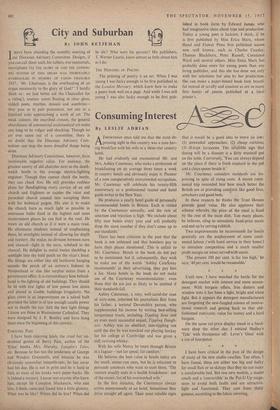Consuming Interest
By LESLIE ADRIAN A FRENCHMAN once told me that the most de- pressing sight in this country was a man hav- ing breakfast with his wife in a three-star country hotel.
He had evidently not encountered Mr. and Mrs. Ashley Courtenay, who make a profession of breakfasting on an average three times a week in country hotels and obviously enjoy it. Pioneer of a now comparatively overcrowded occupation, Mr. Courtenay will celebrate his twenty-fifth anniversary as a professional tourist and hotel guide writer in the New Year.
He produces a yearly hotel guide of personally recommended hotels in Britain. Each is visited by the Courtenays annually, and the rate of selection and rejection is high. 'We include about fifty new hotels every year and will probably drop the same number if they don't come up to our standards.'
There has been criticism in the past that the book is not unbiased and that hoteliers pay to have their places Mentioned. This is unfair to Mr. Courtenay. Hotels in the book do not pay to be mentioned, but if, subsequently, they wish to make use of the words 'Ashley Courfenay recommends' in their advertising, they pay him a fee. Many hotels in the book do not make use of the Courtenay recommendation : even those that do are just as likely to be omitted if their standards fall.
Ashley Cotirtenay, a rosy, well-cared-for man of sixty-nine, inherited his journalistic flair from his father, a teetotal Devonshire parson, who supplemented his income by writing best-selling temperance tracts, including Tippling Sons and an even more successful sequel, Tippling Daugh- ters. Ashley was an obedient, non-tippling son until the day he was knocked out playing hockey for his college at Cambridge and was given a stiff, reviving whisky.
With his wife Nancy he tours through Britain in a Jaguar—'not for speed; for comfort.'
He believes the best value in hotels today are the small, owner-run ones, but he is reluctant to persuade amateurs who want to start them. 'The venture usually ends in a health breakdown : not of the owner, but of his overworked wife.'
In the first instance, the Courtenays always arrive anonymously at an hotel. Sometimes they drive straight off again. Their most reliable signs that it would be a good idea to move on are: (I) unweeded approaches; (2) cheap curtains; (3) ill-kept lavatories. The infallible sign that dining will be a disaster is a dirty mustard pot on the table. Conversely; 'You can always depend on the place if there is fresh mustard in the pot and a clean spoon beside it.'
Mr. Courtenay considers standards are im- proving in spite of rising costs. A recent conti- nental trip reminded him' how much better the British are at' providing comprts like good fires, armchairs and good beds.
In these respects he thinks the Trust Houses provide good value. He also approves their scheme whereby the price of the meal is fixed by the cost of the main dish. Too many places, he believes, cling to unrealistic .fixed-price meals and end up by serving rubbish.
Two improvements he recommends for hotels generally are the employment of more conti- nental labour ('with hotel service in their bones') to stimulate competition and a much smaller profit margin on wines served*with meals.
'The present 100 per cent, is far too high,' he says, '40 per cent, would be reasonable:.
Until now, 1 have watched the battle for the detergent market with interest and some amuse- ment. With bargain offers, free dusters and window tests it has been a light, bright and white fight. But it appears the detergent manufacturers are forgetting the new-fangled science of motiva- tional research and getting back to that old- fashioned motivator, value for money and a hard bargain.
On the same cut-price display stand in a hard- ware shop the other day I noticed Hedley's 'Tide' with threepence off : Lever's 'Omo' with a cut of fourpence.
I have been critical in the past of the design of many of the new studio coudhes. Too often, 1 have found, these are either too big arid bulky for small flats or so skimpy that they do not make a comfortable bed. But two new models, a studio couch and a 'convertible' in the Put-U-Up range, seem to avoid both faults and are attractive, light and functional. They cost from thirty guineas, according to the fabric covering.


































 Previous page
Previous page